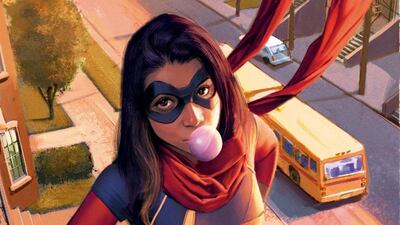Growing up as a brown Muslim girl in America, it was challenging to relate to any female characters on the big screen — none of them looked like me, for starters. A year after I was born, Disney released Aladdin, and because of the colour of her skin and Middle Eastern-sounding name, Princess Jasmine, by default, became the Disney heroine of choice for many young girls like me.
Princess Jasmine, however, was hardly much of a heroine. She was a supporting character, not a lead role, seemingly oppressed by her life in the palace, and had to be shown “a whole new world” by a man. Not to mention, she was heavily Orientalised; one of the only Disney princesses to be pictured in a harem-inspired, skin-baring costume instead of an elegant gown.
I remember attempting to accessorise a teal-toned shalwar kameez while dressing up as Princess Jasmine one Halloween. A few years later, I bought myself a Pink Power Ranger costume. Popular and relatable female characters that didn’t cater to cultural or gender stereotypes were clearly lacking in the '90s.
Now, 30 years after Princess Jasmine was debuted by Disney, we’re witnessing the birth of a new female character — one who is unapologetically brown, Muslim and has majestic superpowers. Ms. Marvel, an original series by Marvel Studios, will start streaming on Disney+ this June, and its main character is Kamala Khan, a Pakistani teenager aged 16 living in New Jersey, who gains the miraculous ability to harness cosmic energy.
The trailer, which was released yesterday, gives a sneak peek into the world of this American Muslim teenage girl navigating high school life. In less than two minutes, viewers witness Kamala’s name mispronounced, her personal style criticised, a congregational prayer in the mosque and a split-second moment from a Bollywood dance sequence. This is a girl who crushes on boys and daydreams, but also fantasises about a bigger life, as she discovers her true identity. “It’s not really the brown girls from Jersey City who save the world,” she states, uttering imposter syndrome insecurities that are all too common among women of colour in real life.
Not only did the makers of Ms. Marvel cast a brown face in the role of its female superhero, but they recruited Iman Vellani, a young Pakistani-Canadian, Muslim woman, sharing many similarities with her on-screen character. The series was created by British Muslim screenwriter Bisha K Ali, and features Emmy Award-winning Pakistani-Canadian filmmaker Sharmeen Obaid-Chinoy as one of the directors.
Muslims have long been waiting for more authentic representation like this in Hollywood, where our cultures are given the nuance and layers they deserve, and our characters are played by genuine members from our communities. While shows such as The Bold Type have created fictional Muslim women with more complexities, Ms. Marvel appears to be a more balanced and relatable role for a younger audience.
More exciting to me is the prospect of introducing my own daughter to mainstream media that paints Muslim women in a positive, not to mention powerful, light. For when it comes to the rare-to-begin-with inclusion of Muslim women on screen, the result is typically one of two extremes — dehumanised terrorists and fundamentalists, or ultra-liberals who might even denounce their faith altogether.
But filmmakers and television directors are now answering the call for more diversity and better representation, largely thanks to the people of colour in the industry who understand the need for more depth and accuracy when depicting brown communities. Only last year, Mindy Kaling and Amazon Studios announced they would be adapting Hana Khan Carries On, a romantic comedy novel by Muslim writer Uzma Jalaluddin, into film. And with the literary world awash with outstanding Muslim fiction novels targeted at young adult readers, the industry is ripe with more stories to be translated from paper to screen.
The movement is certainly gaining momentum in the higher echelons of Hollywood. Last summer, Oscar-nominated Muslim actor Riz Ahmed launched the New Muslim Media Representative Initiative to help rectify what he called “the problem of Muslim misrepresentation on screen”.
While it’s still too early to understand how thoroughly Ms. Marvel might address and combat Islamophobic stereotypes throughout the series, I think it’s safe to say this “whole new world” offers far more magic for Muslim women than the very limited typecasts we’ve been confined to by past film and television productions.









